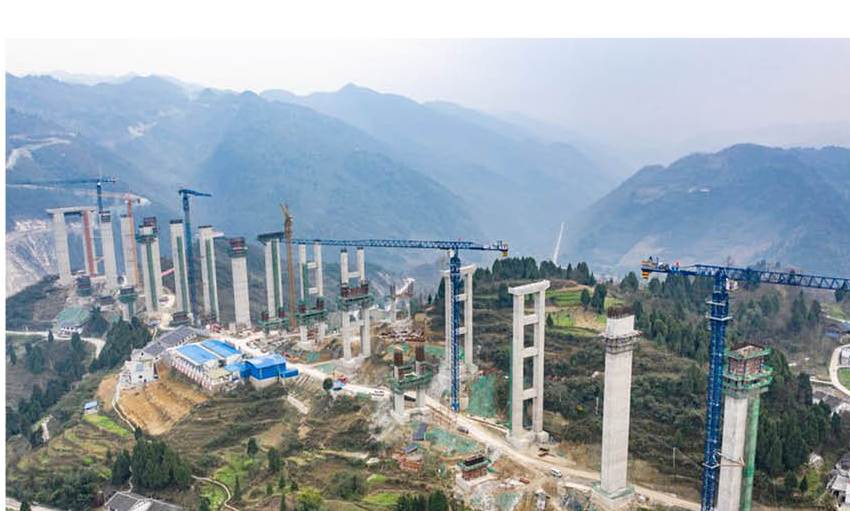Guitars, roads and red tours: former revolutionary base casts off poverty

Xinhua
Guiyang, Mar : 5 Riding on the fast development of industries, improving infrastructure and distinctive cultural tours, a former revolutionary site of the Communist Party of China (CPC) has formally cast off poverty in China's southwestern mountains.
On Tuesday, the government of Guizhou Province announced that Zheng'an County in the province has shaken off poverty. The county is under the jurisdiction of the city of Zunyi, where the CPC conducted its early revolutionary activities. The announcement means that more than 8 million people in the entire city of Zunyi have officially bid farewell to poverty.
Over the years, Zunyi has taken a variety of measures in answer to China's campaign to eradicate absolute poverty in 2020.
Major industries such as guitar-making and tea plantations powered Zunyi's economic growth, while roads, water projects and the revolution-themed tourism also put the city, once mired in grinding poverty, on a fast track toward modernization.
When Zheng Chuanjiu decided to build a guitar-making factory in Zunyi's Zheng'an County in 2013, he was a little nervous.
"There were no raw materials, and transportation was bad," said Zheng, 42. "But the county had advantages in land and labour and there was government support."
Zheng, a native of the county, had found success in the guitar industry in Guangzhou, capital of south China's Guangdong Province. He and his brother established the Guangzhou Shenqu Musical Instruments, a Guangzhou-based guitar-making company, after years of hard work in the southern metropolis.
"The county government of my hometown wanted to develop the guitar-making industry after they found many local migrant workers were working in the industry in Guangzhou," Zheng said. "They established an industrial park and we were the first to join."
The government put forward a variety of preferential policies in rents, financing and taxes, to support guitar-making companies like Zheng's and allow the sector to prosper.
Today, Zheng's company in the county has grown into one with an annual production value of more than 30 million U.S. dollars. One of the country's top five guitar makers, it employs more than 500 local farmers and more than 100 poverty-stricken residents.
Zheng's company is part of a bigger picture. The company's success has led many to jump on the bandwagon. After years of growth, the county is now home to 64 companies specializing in guitar-related fields, churning out about 7 million guitars a year to more than 30 countries and regions across the world and employing more than 15,000 locals.
The guitar industry forms part of the government's efforts to develop local industries. Thanks to geological advantages, the county also saw the emergence of tea gardens and traditional Chinese medicine plantations. All these sectors drove local economic growth.
Given the mountainous landscape in Guizhou, authorities in Zunyi knew the importance of improving infrastructure projects if they wanted to bring the local economy to the next level. So they started building new roads to facilitate transportation.
Last year, Guizhou built 8,116 km of roadways. The Guizhou provincial government spent 29.34 billion yuan (4.2 billion U.S. dollars) building the roadways, including 7,386 km in rural areas, according to the provincial highway bureau. The province also upgraded many old roadways.
Recent News

Do not make expressions casting dout on election: EC
14 Apr, 2022
CM Bhatta says may New Year 2079 BS inspire positive thinking
14 Apr, 2022
Three new cases, 44 recoveries in 24 hours
14 Apr, 2022
689 climbers of 84 teams so far acquire permits for climbing various peaks this spring season
14 Apr, 2022
How the rising cost of living crisis is impacting Nepal
14 Apr, 2022
US military confirms an interstellar meteor collided with Earth
14 Apr, 2022
Valneva Covid vaccine approved for use in UK
14 Apr, 2022
Chair Prachanda highlights need of unity among Maoist, Communist forces
14 Apr, 2022
Ranbir Kapoor and Alia Bhatt: Bollywood toasts star couple on wedding
14 Apr, 2022
President Bhandari confers decorations (Photo Feature)
14 Apr, 2022











